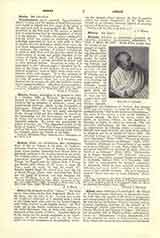

Abba is the Aramaic word for “father.” The word occurs three times in the New Testament (Mark, xiv, 36; Rom., viii, 15; Gal, iv, 6). In each case it has its translation subjoined to it, reading abba o pater in the Greek text; abba, pater in the Latin Vulgate, and “Abba, Father” in the English version. St. Paul made use of the double expression in imitation of the early Christians, who, in their turn, used it in imitation of the prayer of Christ. Opinions differ as to the reason for the double expression in our Lord’s prayer:
(I) Jesus himself used it;
(2) St. Peter added the Greek translation in his preaching, retaining the Aramaic direct address;
(3) The Evangelist added the Greek translation;
(4) St. Mark conformed to an existing Christian custom of praying, by way of hysteron proteron.
A.J. MAAS


